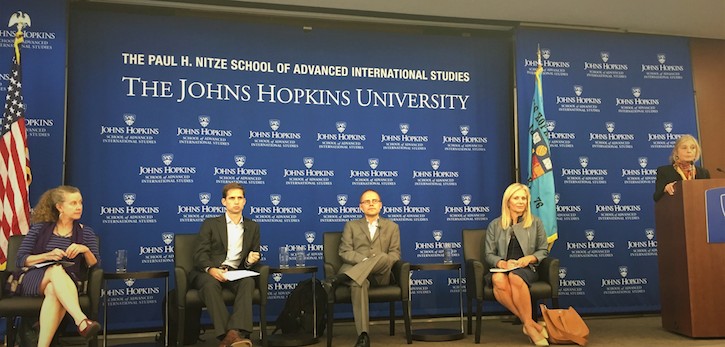
As part of its mission to raise awareness and build understanding of progress, opportunities, and challenges in China’s green finance landscape, the Paulson Institute Green Finance Center convened a panel of experts on green finance in China on October 3 in Washington. Deborah Lehr, Vice Chairman of the Paulson Institute moderated the event, which was co-hosted by the Johns Hopkins’s School of Advanced International Studies (SAIS) Foreign Policy Institute, China Studies Program, and Energy, Resources, and Environment Program.
Panelists brought a wide variety of experiences and perspectives on the topic, reflecting on the many distinct ways green finance can—and will need to—support China’s development.
Jennifer Turner, the Director of the Wilson Center’s China Environment Forum, shared how the Ma’anshan Rural Commercial Bank in Anhui is collaborating with the International Finance Corporation (IFC) and other technical partners to become the first bank in China with all loans meeting international green standards via an IFC China Climate Finance Program designed framework. She noted this provincial-level initiative represents a departure from the standard top-down approach seen with many Chinese projects, but also cautioned the lack of clarity on green standards and a haphazard “Wild West”-like set of supporting policies are challenges that will need to be addressed.
Daniel Besley, senior climate change specialist at the World Bank focusing on carbon markets and innovation, echoed that, in general, a lack of green finance standards is scaring off institutional investors that must be attracted.
With regard to China’s national carbon market, Besley applauded the process taken by the government to start with pilots, establish benchmarks to guide the allocation of emissions rights, and to expand step-wise into others industries after the market is established for the power sector. He expressed his hope that the World Bank can continue to work with the Chinese government on developing and implementing its carbon market ambitions and reiterated that carbon markets have proven their efficiency at mobilizing private finance in over 45 national and 25 sub-national markets.
Johannes Urpelainen, the Director of Energy, Resources, and Environment at SAIS, also emphasized the power sector as a key area for green finance. He described China’s industrial rise as almost entirely powered by massive coal reserves and identified a pressing need for significant public and private funding to help transition away from a dirty coal-powered based economy. Turner added that a part of this transition should be focused on removing the bias toward coal plants embedded in the regulations and contracts governing China’s power grid.
The panel underscored the imperative need for China’s Belt and Road Initiative (BRI) projects to be truly green due to the scope and scale of its reach, particularly for standards setting. Urpelainen noted that BRI funds go to a mix of both green and non-green projects, but Turner said that the balance leans towards the latter, with 80% of BRI energy projects involving fossil fuels based on available data. He also mentioned that international pressure has helped, but that the greenness of BRI projects is ultimately dependent on rules established by the host country.



